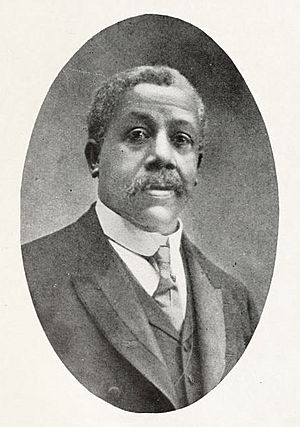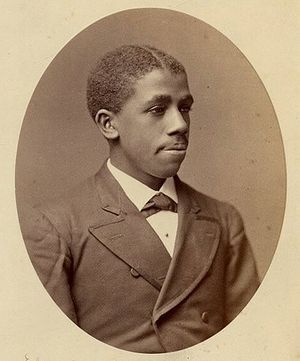Edward Bouchet facts for kids
Quick facts for kids
Edward Alexander Bouchet
|
|
|---|---|

Bouchet c. 1912
|
|
| Born | September 15, 1852 |
| Died | October 28, 1918 (aged 66) |
| Alma mater | Yale University (PhD) |
| Occupation | |
Edward Alexander Bouchet was an amazing American scientist and teacher. He was born on September 15, 1852, and passed away on October 28, 1918. He made history by becoming the first African American to earn a Ph.D. (Doctor of Philosophy) from any university in the United States. He earned his Ph.D. in physics from Yale University in 1876.
Because he was so smart, he was chosen to join the Phi Beta Kappa Society, a very old and respected academic honor society. In 1874, he was also one of the first African Americans to graduate from Yale College. It's important to know that while he was elected to Phi Beta Kappa, another person, George Washington Henderson, was actually the first African American officially inducted. Bouchet was also one of the first 20 Americans of any background to get a Ph.D. in physics. He was the sixth person to earn a Ph.D. in physics from Yale.
Contents
Edward Bouchet's Early Life
Edward Bouchet was born in his family home in New Haven, Connecticut, in 1852. His parents were William Francis Bouchet and Susan (Cooley) Bouchet. Edward's father, William, came to New Haven from Charleston, South Carolina, in 1824. He had been enslaved by a young plantation owner who was a student at Yale.
When his owner graduated from Yale, William Francis became a free man. He then worked as a janitor and later a porter at Yale. He was also a deacon at the Temple Street Church, the oldest black church in New Haven. Edward's mother, Susan, earned money by doing laundry for Yale students. Edward was the youngest of four children and the only boy. He had two sisters named Fanny and Georgie.
School Days in New Haven
In the 1850s and 1860s, there were only three schools in New Haven that accepted black children. Edward went to the Artisan Street Colored School. This school had only one teacher, Sarah Wilson. She saw how smart Edward was and helped him with his studies and dreams.
Edward attended New Haven High School from 1866 to 1868. After that, he went to Hopkins School from 1868 to 1870. He was so good at his studies that he was named the valedictorian of his class, which means he was the top student.
Bouchet's College Studies
News of Edward Bouchet's amazing talents reached Philadelphia. A man named Alfred Cope, from the Society of Friends and Institute for Colored Youth, heard about him. Cope wanted Bouchet to teach at the Institute after he finished his studies. So, Cope paid for Edward's time at Yale to help make this happen.
When Edward graduated from Yale, he was ranked sixth in his entire class. For his Ph.D., Bouchet wrote a long paper called a dissertation. His paper was about measuring how light bends when it passes through different types of glass. This is called measuring the refractive indices.
Working Life as a Teacher
Even after earning his Ph.D., Edward Bouchet found it very hard to get a job teaching or doing research at a university. This was because of racial discrimination at the time. So, in 1876, he moved to Philadelphia.
He took a job at the Institute for Colored Youth (which is now Cheyney University of Pennsylvania). There, he taught physics and chemistry for 26 years. He left this job in 1902. This was during a time when there was a big discussion between important leaders like W. E. B. Du Bois and Booker T. Washington. They disagreed about whether black people should focus on learning trades (industrial education) or going to college (collegiate education).
After leaving the Institute, Bouchet worked in different jobs around the country for the next 14 years. From 1905 to 1908, he was the director of academics at St. Paul's Normal and Industrial School in Lawrenceville, Virginia. Today, this school is called St. Paul's College.
Then, from 1908 to 1913, he was the principal and a teacher at Lincoln High School in Gallipolis, Ohio. He had to retire in 1913 because of health problems.
Later Years and Passing
After he retired, Edward Bouchet moved back to his hometown of New Haven. He passed away in his childhood home at 94 Bradley Street in 1918. He had been ill for a short time. Edward Bouchet never married and did not have any children. He was buried in an unmarked grave at New Haven's Evergreen Cemetery. However, in 1998, Yale University placed a headstone on his grave to honor him.
Edward Bouchet's Legacy
Edward Bouchet's achievements continue to inspire people today.
- The American Physical Society (APS Physics) gives out the Edward A. Bouchet Award. This award honors outstanding physicists in the country for their contributions to physics.
- The Edward Bouchet Abdus Salam Institute (EBASI) was started in 1988 by the late Nobel Laureate, Professor Abdus Salam. It was founded to continue Bouchet's legacy.
- In 2005, Yale University and Howard University created the Edward A. Bouchet Graduate Honor Society. This society is named in his honor and recognizes excellent graduate students.


